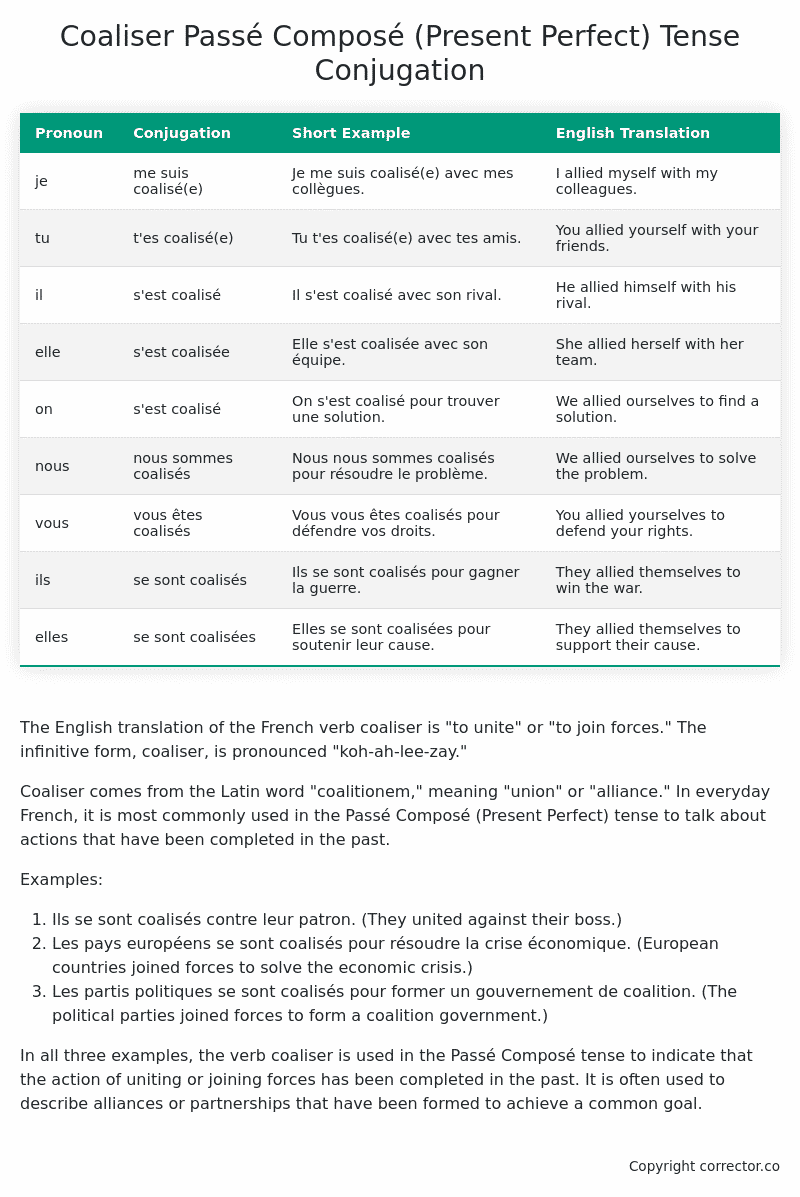Passé Composé (Present Perfect) Tense Conjugation of the French Verb coaliser
Introduction to the verb coaliser
The English translation of the French verb coaliser is “to unite” or “to join forces.” The infinitive form, coaliser, is pronounced “koh-ah-lee-zay.”
Coaliser comes from the Latin word “coalitionem,” meaning “union” or “alliance.” In everyday French, it is most commonly used in the Passé Composé (Present Perfect) tense to talk about actions that have been completed in the past.
Examples:
- Ils se sont coalisés contre leur patron. (They united against their boss.)
- Les pays européens se sont coalisés pour résoudre la crise économique. (European countries joined forces to solve the economic crisis.)
- Les partis politiques se sont coalisés pour former un gouvernement de coalition. (The political parties joined forces to form a coalition government.)
In all three examples, the verb coaliser is used in the Passé Composé tense to indicate that the action of uniting or joining forces has been completed in the past. It is often used to describe alliances or partnerships that have been formed to achieve a common goal.
Table of the Passé Composé (Present Perfect) Tense Conjugation of coaliser
| Pronoun | Conjugation | Short Example | English Translation |
|---|---|---|---|
| je | me suis coalisé(e) | Je me suis coalisé(e) avec mes collègues. | I allied myself with my colleagues. |
| tu | t’es coalisé(e) | Tu t’es coalisé(e) avec tes amis. | You allied yourself with your friends. |
| il | s’est coalisé | Il s’est coalisé avec son rival. | He allied himself with his rival. |
| elle | s’est coalisée | Elle s’est coalisée avec son équipe. | She allied herself with her team. |
| on | s’est coalisé | On s’est coalisé pour trouver une solution. | We allied ourselves to find a solution. |
| nous | nous sommes coalisés | Nous nous sommes coalisés pour résoudre le problème. | We allied ourselves to solve the problem. |
| vous | vous êtes coalisés | Vous vous êtes coalisés pour défendre vos droits. | You allied yourselves to defend your rights. |
| ils | se sont coalisés | Ils se sont coalisés pour gagner la guerre. | They allied themselves to win the war. |
| elles | se sont coalisées | Elles se sont coalisées pour soutenir leur cause. | They allied themselves to support their cause. |
Other Conjugations for Coaliser.
Le Present (Present Tense) Conjugation of the French Verb coaliser
Imparfait (Imperfect) Tense Conjugation of the French Verb coaliser
Passé Simple (Simple Past) Tense Conjugation of the French Verb coaliser
Passé Composé (Present Perfect) Tense Conjugation of the French Verb coaliser (this article)
Futur Simple (Simple Future) Tense Conjugation of the French Verb coaliser
Futur Proche (Near Future) Tense Conjugation of the French Verb coaliser
Plus-que-parfait (Pluperfect) Tense Conjugation of the French Verb coaliser
Passé Antérieur (Past Anterior) Tense Conjugation of the French Verb coaliser
Futur Antérieur (Future Anterior) Tense Conjugation of the French Verb coaliser
Subjonctif Présent (Subjunctive Present) Tense Conjugation of the French Verb coaliser
Subjonctif Passé (Subjunctive Past) Tense Conjugation of the French Verb coaliser
Subjonctif Imparfait (Subjunctive Imperfect) Tense Conjugation of the French Verb coaliser
Subjonctif Plus-que-parfait (Subjunctive Pluperfect) Tense Conjugation of the French Verb coaliser
Conditionnel Présent (Conditional Present) Tense Conjugation of the French Verb coaliser
Conditionnel Passé (Conditional Past) Tense Conjugation of the French Verb coaliser
L’impératif Présent (Imperative Present) Tense Conjugation of the French Verb coaliser
L’infinitif Présent (Infinitive Present) Tense Conjugation of the French Verb coaliser
Struggling with French verbs or the language in general? Why not use our free French Grammar Checker – no registration required!
Get a FREE Download Study Sheet of this Conjugation 🔥
Simply right click the image below, click “save image” and get your free reference for the coaliser present perfect tense conjugation!

Coaliser – About the French Passé Composé (Present Perfect) Tense
Formation of the Passé Composé
Set the auxiliary verb with either
Conjugate the auxiliary verb
Add the past participle
Common everyday usage patterns
Narrating Past Events
Sequential Actions
Describing Completed Actions
Interactions with other tenses
Imperfect Tense
Conditional and Future Tenses
Summary
I hope you enjoyed this article on the verb coaliser. Still in a learning mood? Check out another TOTALLY random French verb conjugation!


